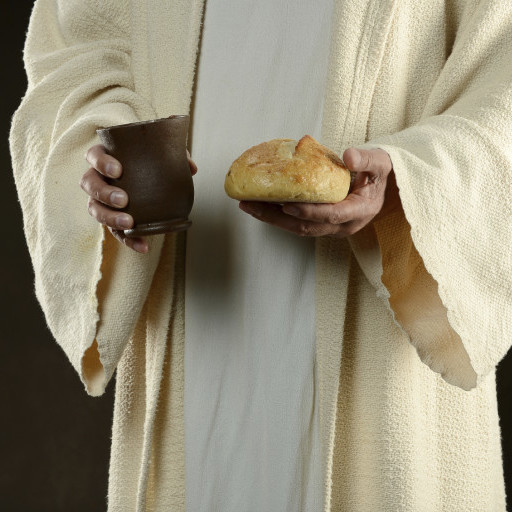“Willing to take upon them the name of thy Son”
The word “willing” here like all the words of the sacrament prayers carries an immense breadth of meaning when viewed in the context of all the scriptures that use it or similar words. In Isaiah 1:18-19 that the Lord will make scarlet sins like white wool if we are willing and obedient:
Isaiah 1:18 Come now, and let us reason together, saith the LORD: though your sins be as scarlet, they shall be as white as snow; though they be red like crimson, they shall be as wool.
19 If ye be willing and obedient, ye shall eat the good of the land:
Before obedience comes willingness of heart. However imperfect we are, we come to the Lord’s Supper willing to be obedient, to repent, to change our ways, pray more, be more kind to others. We eat the bread, the good of the land in gratitude for all we have, for all the Savior has done for us to bring us peace, the reward of the Spirit.
This same theme of willingness and bread/food of the land is enhanced in D&C 64:34
D&C 64:34 Behold, the Lord requireth the heart and a willing mind; and the willing and obedient shall eat the good of the land of Zion in these last days.
Seeing Jesus as the unicorn in Job 39:9-12, we see him as a tender spiritual parent watching over us a children in a crib. We are asked if we will trust in His strength, or fail to do our part in His great work of saving souls. Asking us if we will believe in Him that he will bring home our children/seed and gather our families to heaven reminds us of the tender scene where Jesus asks the father of the seizure prone child if he believed. When he said, “yea Lord, I believe”, he hesitated and realizing he needed to believe to greater degree than possible for a great miracle to occur, he added, “Lord help thou my unbelief.” Christ’s quiet answer is to all of us willing to believe, but feint hearted and forgetful, “I will” and he healed the child instantly. So we too can be healed of all our sins that we have faith in Christ, repent of them and are washed clean through the waters/covenants of baptism and the firey birth of the Holy Spirit.
Job 39:9 Will the unicorn be willing to serve thee, or abide by thy crib?
10 Canst thou bind the unicorn with his band in the furrow? or will he harrow the valleys after thee?
11 Wilt thou trust him, because his strength is great? or wilt thou leave thy labour to him?
12 Wilt thou believe him, that he will bring home thy seed, and gather it into thy barn?
But to be willing to be obedient has more than a token wish to be good. If we are to take upon ourselves the name of the Son, we must be willing to follow Him even in the extremities of life, the trials the losses, the giving our whole souls in service to Him and His children. So we read in Luke 9:24
Luke 9:24 For whosoever will save his life, must be willing to lose it for my sake; and whosoever will be willing to lose his life for my sake, the same shall save it.
Mark gives us further insight in what we are giving our lives for in saying we shall be willing to lose our lives for the gospel too.
Mark 8:38 But whosoever shall be willing to lose his life for my sake, and the gospel, the same shall save it.
To his disciples waiting and supposedly watching/guarding while Jesus prayed his intercessory prayer in Gethsemane, but instead fell asleep, Jesus said:
Matthew 26:41 Watch and pray, that ye enter not into temptation: the spirit indeed is willing, but the flesh is weak.
Jesus is kind and tender hearted to his disciples, understanding their weakness but praising their willingness to try, just like the father of the seizure prone child.
Willingness to help and support one another goes both ways. So when Jesus prayed to the Father, he did not tell the Father what to do, he only asked for what he wanted if the Father was willing to do it. So likewise, Jesus encouraged us to pray thy will not my will be done whenever we ask God for anything. He will give liberally to all answers to our prayers if we ask not amiss.
There are many scriptural references to the word willing, some 68 in all, but we will only touch on a few more. We should be willing to do good works, to distribute to the poor, to communicate, to be honest, and most importantly, to be willing to seek and find the Lord.
1 Timothy 6:18 That they do good, that they be rich in good works, ready to distribute, willing to communicate;
Hebrews 13:18 Pray for us: for we trust we have a good conscience, in all things willing to live honestly.
Acts 17:27 That they should seek the Lord, if they are willing to find him, for he is not far from every one of us;
In the Doctrine and Covenants we read about being willing to preach the gospel to the whole earth, and willing to open our hearts and homes to those who stand in need of shelter.
D&C 1:34 And again, verily I say unto you, O inhabitants of the earth: I the Lord am willing to make these things known unto all flesh;
D&C 75:25 Wherefore, I, the Lord, give unto you this commandment, that ye obtain places for your families, inasmuch as your brethren are willing to open their hearts.
So in closing we ought to develop a willing mind by humbling ourselves daily in prayer and selfless service and each week in the sacrament participation. If we do so we will receive the baptism of fire and of the Holy Ghost and be able to speak with the tongue of angels.
2 Nephi 31:14 But, behold, my beloved brethren, thus came the voice of the Son unto me, saying: After ye have repented of your sins, and witnessed unto the Father that ye are willing to keep my commandments, by the baptism of water, and have received the baptism of fire and of the Holy Ghost, and can speak with a new tongue, yea, even with the tongue of angels, and after this should deny me, it would have been better for you that ye had not known me.
So we press on for the prize of eternal life and take courage in the efforts and rewards of the Prophet Joseph Smith who said:
Joseph Smith History 1: The Lord, who is rich in mercy, and ever willing to answer the consistent prayer of the humble, after we had called upon Him in a fervent manner, aside from the abodes of men, condescended to manifest to us His will. On a sudden, as from the midst of eternity, the voice of the Redeemer spake peace to us …

